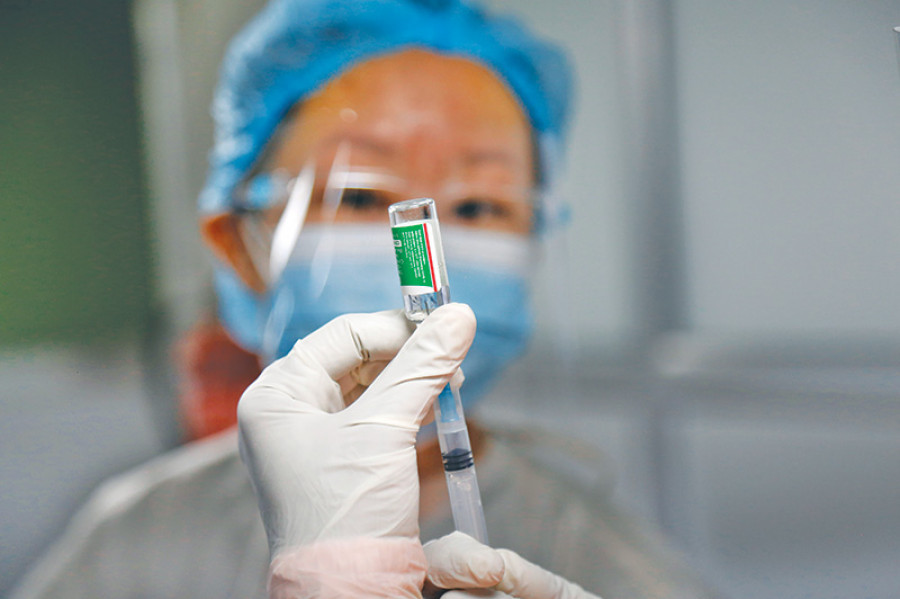Health
Short of doses, government decides to vaccinate only those above 65 from today
The Health Ministry has 1.5 million shots, WHO is delivering 348,000 on Sunday and the delivery of a million doses from Serum Institute of India is expected within a week.
Arjun Poudel
The plan was to inoculate 3.7 million Nepalis above the age of 55 from Sunday as part of the second phase of a nation-wide immunisation campaign against Covid-19.
But now with only 1.5 million doses of vaccine in hand, the government has decided to inoculate only those above the age of 65 which numbers 1.6 million.
“Yes, neither the World Health Organization’s COVAX facility could deliver us the doses it had committed earlier, nor could we buy sufficient doses on our own,” said an official at the Health Ministry, asking not to be named.
Of the 1.5 million vaccine doses, about 500,000 are what remain from the one million doses that India provided in January in grant and another million is what the Serum Institute of India has delivered of the two million Nepal bought last month.
Authorities expect the remaining million doses, bought at $4 per dose, to arrive within a week.
Nepal on Sunday will also get 348,000 doses of the Covishield vaccine from the World Health Organization’s COVAX programme although in early February, it had forecasted to provide 2,256,000 vaccine doses by the end of the month.
The United Nations health agency has committed to providing as a grant enough vaccines to inoculate 20 percent of the country’s population but with a worldwide scramble for the Covid-19 vaccine it is unclear when the rest of the vaccines will be delivered to Nepal.
Earlier, apart from those above 55, teachers of both private and community schools and staff members of private and public transportation services—totalling an estimated 300,000—were in the Health Ministry’s target group. But it is unclear when they will get the jabs.
“We can inoculate other people after we receive additional doses,” said Dr Roshan Pokhrel, chief specialist at the Health Ministry.
Besides those coming from the WHO on Sunday and the Serum Institute of India within a week, China has committed to provide 800,000 doses of the BBIBP-CorV vaccine developed by the Beijing Institute of Biological Products Co Ltd (BBIBP) in China under Sinopharm and officials hope to receive them within the next few days.
The government’s plan to buy an additional five million doses has hit a roadblock as the Serum Institute of India has not responded to its request to sell the doses to Nepal, according to officials.
It has also refused to sell the scarce vaccine for the earlier price and now wants $5.50 to $6 per dose, officials at the Health Ministry said.
The Public Procurement Act-2015 does not allow the same product or service to be bought at a higher price and to untangle this legal knot, the Cabinet has to make a decision.
With the World Health Organization on February 16 authorising emergency use of Covishield, the global roll-out of the vaccine supplied through COVAX began and its demand has gone up.
Covishield, developed by the University of Oxford and the British-Swedish pharmaceutical giant AstraZeneca, is the preferred choice of Nepal as the country’s existing system supports storage and supply of the vaccine.
But for the moment, the Ministry of Health and Population plans to inoculate all those above 65 years with the Covishield vaccine.
The programme will be launched from more than 2,000 immunisation centres of the over 16,000 such centres set up throughout the country for regular immunisation programmes of children.
Prime Minister KP Sharma Oli will inaugurate the programme by taking the jab at the Tribhuvan University Teaching Hospital, according to Pokharel.
The ministry said that President Bidya Devi Bhandari, Vice President Nanda Bahadur Pun and office bearers of various constitutional bodies will also be inoculated in the second phase of the campaign.
Experts say that success of the second phase of campaign depends on the participation of the targeted group.
“We’d like to request all people above 65 to take the vaccine, which is safe and effective,” said Pokhrel.
Officials are aware of vaccine hesitancy among the population and have directed concerned agencies to monitor the situation.
“A minor incident [adverse effects following immunisation] could affect the immunisation programme,” Dr Shyam Raj Upreti, coordinator of the Covid-19 vaccine advisory committee, told the Post.
“But we have alerted the agencies concerned about it and have directed them to take all possible measures to address any untoward incidents at the earliest.”
Nepal rolled out its vaccination drive on January 27 with 1 million doses of vaccine provided by India under grant assistance. In the first phase, front line workers—health workers, female community health volunteers, security personnel deployed for the management of bodies of people who died due to complications arising from coronavirus infections—as well as prisoners, ambulance drivers, people residing in old-age homes, journalists, diplomatic staff, employees of financial institutions, representatives and staffers of local governments and lawmakers were inoculated.
As the elderly with comorbidities are more at risk of severe illness and death from Covid-19, authorities are eager that they get vaccinated in the second phase.
“It is also the responsibility of the family members to get their eligible parents and grandparents immunised to keep them safe from the infection, as elderly people are at a greater risk of dying,” said Pokharel.




 20.72°C Kathmandu
20.72°C Kathmandu















